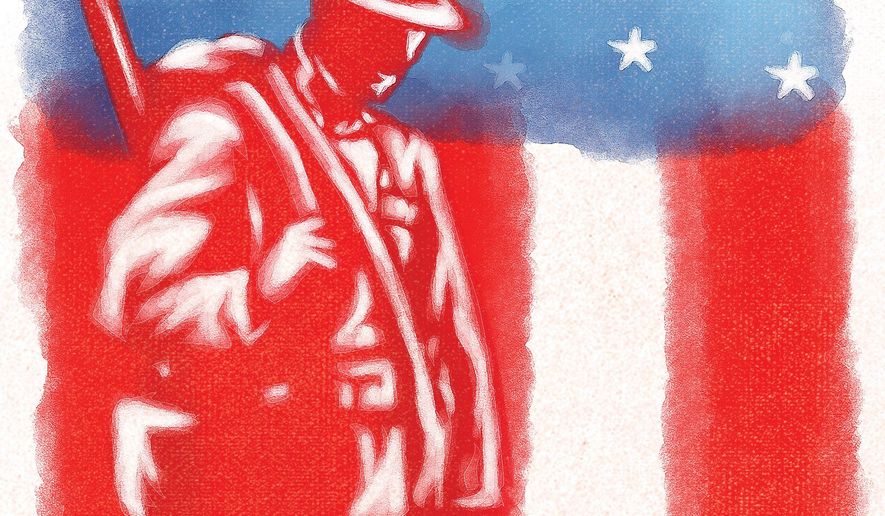OPINION:
Joyce Kilmer (1886-1918) was an American soldier-poet who was killed in France during the waning months of World War I. He is remembered today primarily for his poem “Trees,” which is, unfortunately, one of the most mercilessly parodied poems in all American literature.
Kilmer may not have been a great poet, but he was an honest one. He was one of those folksy, sentimental poets or storytellers whose verses ordinary people could take to their hearts and even commit to memory.
Kilmer was born in New Brunswick, N.J., and was educated at Rutgers College and Columbia University. After a brief stint as a high school Latin teacher, he found his true calling as a journalist and poet, publishing his first collection of verses, “Summer of Love,” in 1911.
Raised Anglican, Kilmer and his wife converted to Roman Catholicism in 1913. Because many of his poems celebrated his Catholic faith, critics compared him to leading English Catholic poets of the time like Hilaire Belloc and G.K. Chesterton.
While Kilmer showed promise, his poetic gifts would never have the chance to mature. Shortly after the United States entered World War I in April 1917, Kilmer enlisted in the U.S. Army as a private. At the time, the Kilmers had four children — one of whom was afflicted with polio — and a fifth on the way. He could have easily avoided military service, but as a Christian and as a patriot whose ancestors had fought for America as far back as the Revolution, he felt duty bound to answer the call.
Arriving in France, Kilmer was assigned to the famous “Fighting 69th” U.S. Infantry Regiment as a statistician. But he wanted no part of what front-line soldiers scorned as “bulletproof jobs.” He got himself transferred to intelligence — which meant the highly dangerous task of scouting No Man’s Land and reporting back on the movements of enemy Germans. By all accounts, he was fearless; eagerly volunteering again and again for the most hazardous missions.
His courage and coolness earned Kilmer a promotion to sergeant and the “worship” of the men around him. Once, his supply sergeant gave him a mock dressing-down for ruining so many uniforms while crawling through the barbed wire. “Do you have to get so close to the German lines, Kilmer?” he demanded, with a barely suppressed grin. “Do you think I’m your private valet?” Enjoying the badinage, Kilmer feigned contrition and “solemnly promised” to be more careful in the future. When he left, a new uniform in hand, the supply sergeant turned to his clerk and said with awe, “There goes the bravest man in this man’s army.”
When the exploits of the Fighting 69th were made into a film in 1940, Kilmer appeared as a character, sensitively portrayed by actor Jeffrey Lynn.
Kilmer was leading a scouting party on July 30, 1918, when he was killed by a sniper’s bullet. He was 31 years old. The French government awarded him the Croix de Guerre posthumously.
As we observe Memorial Day on this, the centennial year of Kilmer’s death, it is appropriate to remember him with some verses of his own from a poem appropriately titled “Memorial Day.” While the opening stanzas may strike the modern reader as a bit syrupy, this is a poem that has to be read to the end to be fully appreciated.
The bugle echoes shrill and sweet,
But not of war it sings to-day.
The road is rhythmic with the feet
Of men-at-arms who come to pray.
The roses blossom white and red
On tombs where weary soldiers lie;
Flags wave above the honored dead
And martial music cleaves the sky.
Above their wreath-strewn graves we kneel,
They kept the faith and fought the fight.
Through flying lead and crimson steel
They plunged for Freedom and the Right.
May we, their grateful children, learn
Their strength, who lie beneath this sod,
Who went through fire and death to earn
At last the accolade of God.
In shining rank on rank arrayed
They march, the legions of the Lord;
He is their Captain unafraid,
The Prince of Peace Who brought a sword.
If you read the poem through, and if the last line gave you a jolt, you may have to admit that Joyce Kilmer, by any standard a gallant soldier, was a real poet as well.
• Thomas C. Stewart is a retired New York investment banker and a former U.S. Naval attack commander.




Please read our comment policy before commenting.